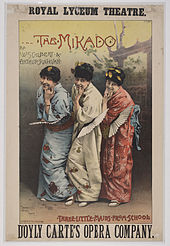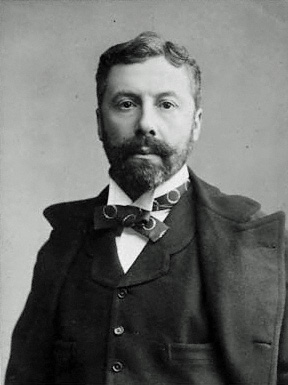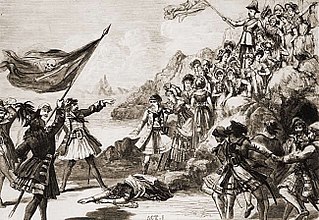
American Savoyards was an Off-Broadway and touring repertory theatre company that produced light operas, principally the works of Gilbert and Sullivan, in New York City and on tour between 1948 and 1967.

American Savoyards was an Off-Broadway and touring repertory theatre company that produced light operas, principally the works of Gilbert and Sullivan, in New York City and on tour between 1948 and 1967.
In 1948, director Dorothy Raedler started a professional Gilbert and Sullivan repertory company, The Masque and Lyre Light Opera Company, named after an amateur theatre group that she had founded in 1939 in college and directed under that name. [1] [2] They opened on Long Island with four different G&S shows, moving to New York City in 1949. The company stayed in New York City for three and half years, performing ten of the Savoy Operas plus Cox and Box . [3]

Raedler planned to take the company on tour in 1952. She traveled to England in June 1952 with her leading comic baritone and leading soprano, Rue and Sally Knapp, [4] to research W.S. Gilbert's staging, choreography, costumes, properties and other aspects of the original Gilbert and Sullivan productions. [2] She intended her productions to follow the performance "traditions" of the D'Oyly Carte Opera Company, and she replicated "authentic" costumes as closely as possible. Raedler's intentions, as stated in the company's program notes, were to avoid "pork pie" gags or cheap laughs, to stay true to Gilbert's stylistic intentions and to give each member of her company intensive training in the art. Raedler also decided that her company would use American stage diction, rather than British, and attractive actors, to cater to her audiences. Like Gilbert, Raedler was known as a hard taskmaster in rehearsals and an exacting director. [5]
For this first tour, Raedler renamed the company American Savoyards. The first shows on tour were The Mikado and Patience . Early tours included U.S. states from Florida to Maine. Subsequent tours included places as far away as California and Canada. Each winter, the company returned to New York City, often performing at the Jan Hus Playhouse on East 74th Street, the downstairs room in a church. The group claimed to be the only professional theatre company performing the full G&S repertoire, as the D'Oyly Carte had retired several productions. [5]
In 1953, the American Savoyards performed for ten weeks over the summer in Cumston Hall, a Victorian theater in Monmouth, Maine. [1] They returned each summer for seven years to Monmouth, generally for ten-week seasons. Their format was eight performances of a different G&S show each week (6 evenings, 2 matinees, no Sunday performances). [6] In 1956, Ronald Bush, the company's principal bass-baritone, gave up his on-stage roles to become its music director. [7] [6] The same year, Company first performed Utopia Limited , probably the first professional performances of this work in North America since 1894. In 1957, Raymond Allen took over the comic leads when the Knapps left the company. [6] In 1958, the company added three non-G&S operettas, and in 1959 they added The Grand Duke , in its North American professional premiere. That summer, the company performed four other G&S shows and five non-G&S shows in Monmouth. It was the company's last summer in Maine. [8] [9]

The company continued performing in New York (including at the Jan Hus, Shakespearewrights Theatre, Greenwich Mews, Actor's Playhouse, Brooklyn Academy of Music and other venues) and toured elsewhere in the United States. [8] By 1965, the company was having financial difficulties, and Raedler was ultimately unable to hold it together. Its final performance was on December 31, 1967, at the Jan Hus theatre. Not long after the company closed, a new professional Gilbert and Sullivan company grew up in residence at the Jan Hus, the Light Opera of Manhattan (LOOM). The American Savoyards' then principal comic, Raymond Allen, joined LOOM, [10] and Raedler sold many of the company's costumes and stage properties to the new company. [5]
The company's accompaniment consisted of a piano and Hammond organ, although occasionally it performed with the full Sullivan orchestra on tour. Musical director Ronald Bush generally conducted from the organ. All of the productions were directed and choreographed by Raedler. The principal actors were mostly members of Actors' Equity Association, and the company often used young local talent in the chorus. The company performed long seasons. [5]
The actors included Sally Knapp (later a Broadway and television commercial actress) as the company's first principal soprano, and her brother, Rue Knapp, in the comic baritone roles. Ronald Bush sang the bass-baritone roles with the company until the mid-1950s, when he became musical director. Other company members included Charles Nelson Reilly, Dominic Chianese (later "Uncle Junior" in The Sopranos ), Bill Tost (later the long-time "Bellomy" in The Fantasticks ); Bob Randall (the novelist, who wrote the comedy, 6 Rms Riv Vu ), Ellen Shade [11] and Robert Schmorr (opera singers who later appeared at the Metropolitan Opera), Arthur Mathews (who later appeared on Broadway), opera singer and director Don Yule, James Stuart (who founded the Ohio Light Opera), Allan Lokos (Broadway actor [12] and now a minister). [8] Raymond Allen, later with LOOM and New York City Opera, began with tenor roles and replaced Knapp in the comic "patter" roles in 1957. [6] [10]
Dorothy Raedler was born February 24, 1917, in New York City. She attended Hunter College. In addition to her Gilbert and Sullivan companies, she directed non-G&S operas in various venues, including several at New York City Opera, Baltimore Civic Opera Company and elsewhere from the 1960s. [2] The New York Times wrote: "Plácido Domingo, a new tenor, was Pinkerton. ... Dorothy Raedler's direction and Franco Patane's authoritative conducting were major factors in a presentation that offered nothing but pleasure." [13] Raedler also directed Gilbert and Sullivan productions for City Opera and for the City Center Gilbert & Sullivan Company, [2] which had casts including such Metropolitan Opera singers as Nico Castel, Muriel Costa-Greenspon, Robert Hale, Ellen Shade, and Frank Poretta, Sr., as well as Broadway actors Nancy Dussault, Barbara Meister, [14] Ruth Kobart, [15] and Raymond Allen. [10]
Raedler also brought several of the former principal actors from American Savoyards, including John Carle, Bill Tost, James Wilson, Sandra Darling, and Ruth Ray (calling them "The Five Savoyards"), to New York City and Connecticut public schools to perform Gilbert and Sullivan excerpts for the children. She served on the board of directors of the Harlem School of the Arts. [16]
Raedler retired to St. Croix VI in the Virgin Islands in 1968, where she helped to found the St. Croix School of the Arts, a program for children. She died of cancer on December 11, 1993. [2] [16]

Richard D'Oyly Carte was an English talent agent, theatrical impresario, composer, and hotelier during the latter half of the Victorian era. He built two of London's theatres and a hotel empire, while also establishing an opera company that ran continuously for over a hundred years and a management agency representing some of the most important artists of the day.

The Pirates of Penzance; or, The Slave of Duty is a comic opera in two acts, with music by Arthur Sullivan and libretto by W. S. Gilbert. Its official premiere was at the Fifth Avenue Theatre in New York City on 31 December 1879, where it was well received by both audiences and critics. Its London debut was on 3 April 1880, at the Opera Comique, where it ran for 363 performances.

Lillian Russell was an American actress and singer. She became one of the most famous actresses and singers of the late 19th and early 20th centuries, known for her beauty and style, as well as for her voice and stage presence.

John Lamb Reed, OBE was an English actor, dancer and singer, known for his nimble performances in the principal comic roles of the Savoy Operas, particularly with the D'Oyly Carte Opera Company. Reed has been called "the last great exponent" of the Gilbert and Sullivan comedy roles.

Patience; or, Bunthorne's Bride, is a comic opera in two acts with music by Arthur Sullivan and libretto by W. S. Gilbert. The opera is a satire on the aesthetic movement of the 1870s and '80s in England and, more broadly, on fads, superficiality, vanity, hypocrisy and pretentiousness; it also satirises romantic love, rural simplicity and military bluster.

The D'Oyly Carte Opera Company is a professional British light opera company which, from the 1870s until 1982, staged Gilbert and Sullivan's Savoy operas nearly year-round in the UK and sometimes toured in Europe, North America and elsewhere. The company was revived for short seasons and tours from 1988 to 2003, and since 2013 it has co-produced four of the operas with Scottish Opera.

Sir Henry Lytton was an English actor and singer who was the leading exponent of the starring comic patter-baritone roles in Gilbert and Sullivan operas from 1909 to 1934. He also starred in musical comedies. His career with the D'Oyly Carte Opera Company spanned 50 years, and he is the only performer ever knighted for achievements in Gilbert and Sullivan roles.

The Mountebanks is a comic opera in two acts with music by Alfred Cellier and Ivan Caryll and a libretto by W. S. Gilbert. The story concerns a magic potion that causes the person to whom it is administered to become what he or she has pretended to be. It is similar to several "magic lozenge" plots that Gilbert had proposed to the composer Arthur Sullivan, but that Sullivan had rejected, earlier in their careers. To set his libretto to music, Gilbert turned to Cellier, who had previously been a musical director for Gilbert and Sullivan and had since become a successful composer. During the composition of the piece Cellier died, and the score was finished by the original production's musical director, Ivan Caryll, who became a successful composer of Edwardian Musical Comedy.
Light Opera of Manhattan, known as LOOM, was an off-Broadway repertory theatre company that produced light operas, including the works of Gilbert and Sullivan and European and American operettas, 52 weeks per year, in New York City between 1968 and 1989.

Leonora Braham was an English opera singer and actress primarily known as the creator of principal soprano roles in the Gilbert and Sullivan comic operas.

Kenneth Sandford was an English singer and actor, best known for his performances in baritone roles of the Savoy Operas of Gilbert and Sullivan.
Patricia Leonard was an English opera singer, best known for her performances in mezzo-soprano and contralto roles of the Savoy Operas with the D'Oyly Carte Opera Company.

New York Gilbert and Sullivan Players is a professional repertory theatre company, based in New York City that has specialized in the comic operas of Gilbert and Sullivan for over 40 years. It performs an annual season in New York City and tours extensively in North America.

Selina Simmons Belasco Dolaro was an English singer, actress, theatre manager and writer of the late Victorian era. During her career in operetta and other forms of musical theatre, she managed several of her own opera companies and directed the Royalty Theatre in London. She is best remembered as a producer of the original production of Trial by Jury by Gilbert and Sullivan. Dolaro sang the title role in the opera Carmen in the first English language version of that opera with the Carl Rosa Opera Company. She also wrote plays and novels.

Raymond Allen was an American stage actor who was best known for his performances in Gilbert and Sullivan and other light operas from the 1950s through the 1980s. He spent most of his career with the American Savoyards and later the Light Opera of Manhattan.

Furneaux Cook, born John Furneaux Cook, was an English opera singer and actor best known for baritone roles in the comic operas of Gilbert and Sullivan and Alfred Cellier on the London stage. Cook appeared on stage for over 30 years in London, the British provinces and America.
James Conroy-Ward is a retired English actor, singer and music publisher best known for performing the Gilbert and Sullivan principal comic roles with the D'Oyly Carte Opera Company.

Alice May was an English singer and actress best remembered as the creator of the soprano role of Aline in Gilbert and Sullivan's The Sorcerer (1877).

James F. Stuart was an American opera director and operatic tenor. He began his career performing and touring with Dorothy Raedler’s American Savoyards. He became a specialist in the patter roles of Gilbert and Sullivan, including Sir Joseph Porter, K.C.B. in H.M.S. Pinafore, Ko-Ko in The Mikado, and Reginald Bunthorne in Patience among others. In 1979 he founded the Ohio Light Opera in Wooster, Ohio, serving as the company's artistic director for two decades. During his tenure there he also often worked as producer, stage director, translator, and performer. He himself performed in fifty of the more than two hundred productions mounted by the company while he was director. He also sang on twenty of the company's live operetta recordings, which encompassed works by both Americans and Europeans.
June Winters was an American actress and singer who was actively performing from the mid-1930s into the 1960s. She first came to prominence starring in the Broadway musical Hellzapoppin at the Winter Garden Theatre from 1938 through 1941. A versatile performer, her career spanned a wide array of genres from vaudeville to musicals to opera and popular music. Married to trumpeter and songwriter Hugo Peretti, she achieved her greatest success creating content for children as the "Lady in Blue" in partnership with her husband; releasing dozens of albums with sung and spoken material from 1947 into the early 1960s. The character Lady in Blue also had her own comic strip and Saturday morning radio program on NBC Radio. The couple also co-founded the Mayfair Records company.